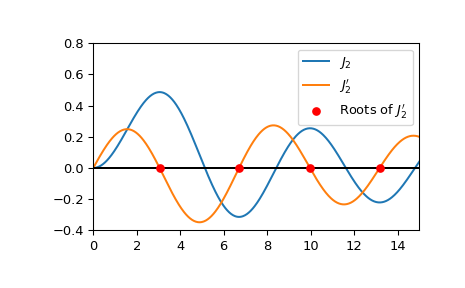jnp_zeros — SciPy v1.15.3 Manual (original) (raw)
scipy.special.
scipy.special.jnp_zeros(n, nt)[source]#
Compute zeros of integer-order Bessel function derivatives Jn’.
Compute nt zeros of the functions \(J_n'(x)\) on the interval \((0, \infty)\). The zeros are returned in ascending order. Note that this interval excludes the zero at \(x = 0\)that exists for \(n > 1\).
Parameters:
nint
Order of Bessel function
ntint
Number of zeros to return
Returns:
ndarray
First nt zeros of the Bessel function.
See also
Derivatives of integer-order Bessel functions of the first kind
Float-order Bessel functions of the first kind
References
Examples
Compute the first four roots of \(J_2'\).
from scipy.special import jnp_zeros jnp_zeros(2, 4) array([ 3.05423693, 6.70613319, 9.96946782, 13.17037086])
As jnp_zeros yields the roots of \(J_n'\), it can be used to compute the locations of the peaks of \(J_n\). Plot\(J_2\), \(J_2'\) and the locations of the roots of \(J_2'\).
import numpy as np import matplotlib.pyplot as plt from scipy.special import jn, jnp_zeros, jvp j2_roots = jnp_zeros(2, 4) xmax = 15 x = np.linspace(0, xmax, 500) fig, ax = plt.subplots() ax.plot(x, jn(2, x), label=r'$J_2$') ax.plot(x, jvp(2, x, 1), label=r"$J_2'$") ax.hlines(0, 0, xmax, color='k') ax.scatter(j2_roots, np.zeros((4, )), s=30, c='r', ... label=r"Roots of J2′J_2'J2′", zorder=5) ax.set_ylim(-0.4, 0.8) ax.set_xlim(0, xmax) plt.legend() plt.show()
